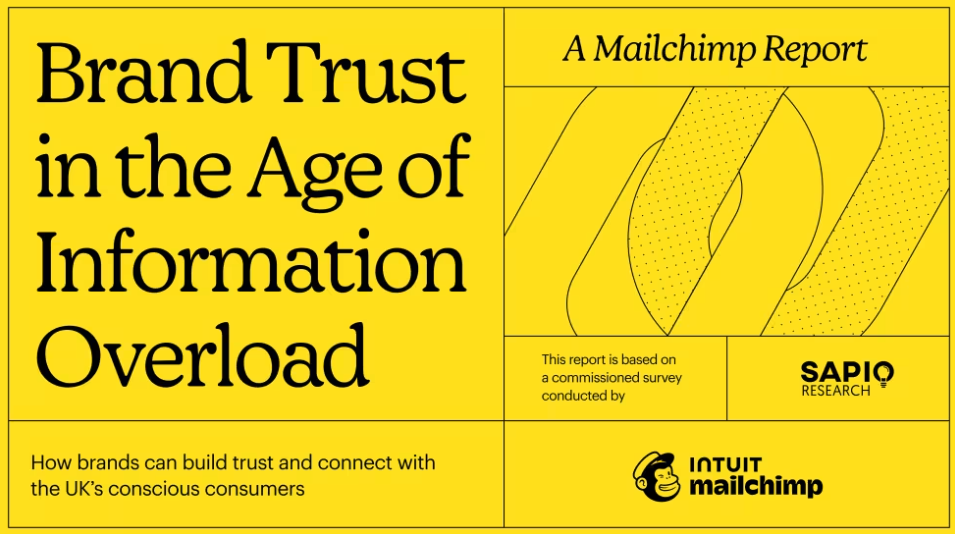Almost half of younger UK consumers are “not concerned” about how companies use their data and 72% of the same demographic believe that personalisation means their desired purchases will “come to them” without any searching required, according to new research.
Intuit Inc. (Nasdaq: INTU), the global financial technology platform that makes Intuit TurboTax, Credit Karma, QuickBooks, and Mailchimp, has shared the latest insights from Intuit Mailchimp’s research report, Brand Trust In the Age of Information Overload. Ecommerce’s evolution over recent years reflects our time-poor lifestyles, as consumers expect increasing convenience, ease and pace from vendors. The report – sourced from a survey of 1500 consumers in the UK – reveals the public’s view on the future of shopping.
Overall, British shoppers feel personalisation gives hope to less ‘work’ and ‘fear of missing out’ (FOMO) around shopping. Nearly half (48%) believe that data-informed technology and audience segmentation will reduce time spent searching for products and services because the purchases they desire will be automatically suggested. Younger generations feel this sentiment most strongly, with 72% of 18-to-34 year-olds anticipating this future.
Personalisation gaining, FOMO waning
With the majority of consumers (60%) welcoming greater personalisation, both they and vendors have the potential to win. Over a third (36%) of Brits currently believe personalisation stops them “missing out” on products, trends and deals – and feel they are receiving information “they’re genuinely interested in”. Furthermore, 43% appreciate emails about limited stock or exclusive items, a key tactic in diminishing FOMO.
However, while Brits are happy to trade their personal data in return for more relevant material from marketers, 62% feel they need to see more value in this exchange. Personalised campaigns are the (joint) third most-welcome marketing initiative among consumers, on par with brands showing a commitment to a cause. These follow behind winning prizes/store credit for reviews or surveys (in first place) and sticking to selling products (in second).
Shoppers also say they appreciate the way personalised marketing has allowed brands to be considerate and respectful of consumers’ feelings. Over half (56%) of British consumers appreciate thoughtful marketing, such as the opportunity to opt out of communications around Mother’s Day or Father’s Day.
The AI Advantage
Consumers are broadly open to brands using new technology to craft messages. Nearly two-thirds (65%) of Brits are comfortable with at least some element of AI being used to support brand content, in comparison to 35% who are only comfortable with human-made communications. But their expectations for the messages themselves—not just how those messages are produced—might be a more persuasive metric for marketers implementing more AI tools in their daily work.
For shoppers, the joint highest purchasing driver – alongside a company’s values and ethics – is a strong brand identity. Yet buyers also expect a steady stream of personalised offers. Over two in five (43%) appreciate emails about limited stock or exclusive items, while 60% “like” personalised content. This rises to 75% for those aged 18-24. For marketers, meeting these rising expectations will increasingly require more efficient tools, whether they’re deploying generative AI to craft optimised creative for different platforms or leveraging predictive analytics to make targeted recommendations.
Jim Rudall, Head of EMEA at Intuit Mailchimp, said: “The latest iterations of social media algorithms focus on discovery, and the data we’re seeing here may explain why. Shoppers want to be targeted with things they may want to purchase, allowing them to fortuitously stumble upon new brands and products that align with their desires.
“The future of shopping looks even brighter when you consider that almost half of UK consumers believe the products they’re seeking will find them, making online shopping less arduous and more exciting. This doesn’t come as a surprise, given consumers’ current focus on convenience. However, it’s not just about product recommendations: nearly one in four shoppers want to see more personalised brand marketing campaigns, too. With this in mind, marketers must be prepared to build communications not only around the products consumers want, but the lives they want to live.”
Brands need to be mindful of data-handling concerns
But while AI provides the opportunity to give customers a more personalised experience, it is crucial that this is balanced with data privacy and responsibility. Ultimately, personalisation isn’t possible without data, but companies must ensure it’s handled properly and used only in ways that customers approve.
While four in five British shoppers (80%) need to be assured by brands that they’re using their data responsibly, just a small minority (15%) are unhappy to share their data with brands they trust – illustrating the importance of building a relationship with consumers. Interestingly, one in four said they’re not concerned about what brands do with their data. A generation gap was observed here with 48% of those aged 18-24 not conc
The interviews were conducted online by Sapio Research, on behalf of Mailchimp in February 2024 using an email invitation and an online survey. The survey was conducted among 10,000 consumers in Australia, Denmark, Germany, Netherlands, New Zealand, Norway, Spain, Sweden and the UK. Of that 10,000, 1,500 were UK consumers.










